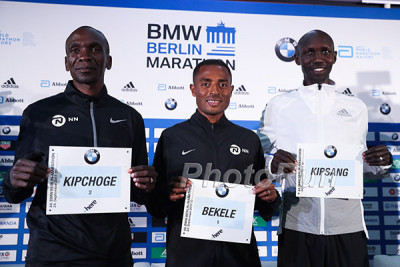Jos Hermens: Kenenisa Bekele Must Become More ‘Professional’ If He Is To Realize Marathon Potential
By Jonathan Gault
September 26, 2017
On Monday morning, 24 hours after Kenenisa Bekele concluded his disappointing 2017 season by dropping out of the BMW Berlin Marathon just after the halfway point, Bekele went to breakfast in the hotel restaurant at the InterContinental Berlin. His longtime agent, Jos Hermens, waited for the restaurant to empty out. Then he and Bekele began to talk.
At its core, an agent’s job is to keep his client happy. But neither Hermens nor Bekele were happy about how this year had played out, and Hermens believed it was time to level with Bekele. What followed was what Hermens described as a “friendly but strong” conversation in which Hermens asked the 35-year-old Bekele to consider what he wants from the rest of his career. There was no yelling, but Hermens had a point to make.
His biggest message: if Bekele is to continue in the marathon, it is time to go all-in.
Hermens said that he believes Bekele must improve “everything” in his preparation, but one of the most important factors is how he balances his running with his business interests. Bekele owns a hotel, among other businesses in Ethiopia, and he is an involved owner, often visiting the properties to check up on them after completing his training sessions in the morning. But both activities require time, and it can be difficult to achieve the recovery that a full marathon buildup requires while devoting time and energy to other things.
“This cannot go on,” Hermens said. “He is not behaving professional. If you don’t prepare well, you’re not being professional. If you want to prepare for [a] marathon, you have to do the work, otherwise you’re not professional. He has to make the decision to be disciplined and professional or he’s going to stop his career. If you don’t want to do the work, forget it, that’s what I told him today.
“If you want to run a good marathon, you need preparation. If you don’t do the homework, even with the big tank he has, it’s tough in the marathon. In track and field you can get away with it maybe, but in the marathon, if you’re not 100% fit and you can’t do all the work, then you will hurt.
“I compare [Bekele’s preparaton] with Eliud [Kipchoge, who won in Berlin and whom Hermens also represents], it’s a total difference. [Eliud]’s one of the most professional athletes I have the honor to work with…For several years on the track, he was beaten by Kenenisa, but now he has the total package of talent, hard work, and professionalism…I see the difference between those two athletes.”
In Berlin, Hermens admitted that the conditions did Bekele no favors. Though the temperature (mid-50s Fahrenheit) was not overly cold, Hermens said that the rain during the race and the water that kicked up onto Bekele’s legs from both his own stride and those of the surrounding athletes caused his legs to become cold and wet and eventually drop out. Wilson Kipsang‘s agent, Arien Verkade, provided a similar explanation to LetsRun for why his client dropped out.
But the rest of the field faced those conditions as well, and some athletes, like Eliud Kipchoge, who raced in arm warmers and half tights, were ready for it. In Bekele’s first marathon of the year, in Dubai in January, he had a good reason for dropping out: he fell at the start line and was trampled, leading to back, calf, and hip injuries. Those injuries persisted well into February, severely cutting into his buildup for April’s London Marathon and, considering the dramatically shortened preparation, Bekele’s 2:05:57 runner-up finish there was a terrific race. Renato Canova, the Italian coach who drew up Bekele’s training plan for London, later wrote on the LetsRun.com messageboard that he did not think any other athlete could have broken 2:10 off of Bekele’s buildup, a credit to the Ethiopian’s great mind and natural engine. But Bekele was healed for Berlin and, theoretically, should have been ready to go.
“There is no excuse,” Hermens said. “There were no injuries, it was just lack of hard work. And that’s okay. He has had a great career. And if that’s enough, that is fine, but he needs to be clear.”
It has been a long time since Bekele showed up to a race at 100 percent. Before last year in London, Bekele said he was 90% fit. Before Berlin 2016, he said 80%. Before Berlin this year, 90%. Bekele has had his share of injuries ever since winning his final world title on the track in 2009, from a torn calf to a stress fracture in his ankle to Achilles issues and the back and hip problems that bothered him after Dubai. Injuries are always a bigger risk as an athlete ages, and that too requires time and effort in the form of rehab and prehab.
Hermens could tell during Sunday’s race that Bekele had not managed those injuries properly. Bekele’s right calf is smaller than his left calf, and because of that, there is an imbalance between his legs. Bekele had been given a set of exercises to perform in order to minimize the effects of that imbalance, but as he studied Bekele’s form during the race, Hermens could tell that he had not been doing the exercises.
During their conversation yesterday, Bekele asked why, if he was not prepared to run in Berlin, Hermens had not canceled the race. Hermens responded that it was not his decision to make. Hermens was not with Bekele in practice every day; only Bekele knew what kind of shape he was in. Bekele did not have a large financial incentive to run Berlin — “the money was shit,” according to Hermens — but, mesmerized by a shot at the world record that he so craves, he gave it a shot anyway.
“He’s a great athlete, a great talent, but sometimes it is time to regroup,” Hermens said.
It would be foolish to classify Bekele’s marathon career as a failure. His personal best of 2:03:03 makes him the second-fastest marathoner in history, and he ran that time just one year ago to win in Berlin. But Bekele’s marathon stat line — eight starts, two wins, three DNFs — is not what either he or his manager expected from the man who dominated the world of distance running for most of the 2000s and still owns world records at both 5,000 and 10,000 meters.
“Eight marathons, two wins, that’s not Kenenisa Bekele. That’s not [what] the Kenenisa Bekele that I know [is] capable of,” Hermens said.
Is The Lack of Cross Country The Explanation?
The Kenenisa Bekele of 2017 is not the same Kenenisa Bekele that won gold medals with stunning regularity a decade ago. From 2001 to 2008, Bekele had a routine in place. He would spend the winter building his base and conclude it by running at the World Cross Country Championships, where he piled up a ridiculous 12 gold medals during that span. Running cross country gave him the strength he needed to carry him through the summer track season, and the results on that surface were almost as good: three golds and one silver at the Olympics; five golds and a bronze at the World Championships. But Bekele has not run at World XC since 2008, and has not run a cross country race of any kind since moving to the marathon in 2014.
“For Kenenisa, everything changed when he didn’t do cross country anymore,” Hermens said. “They started changing World Cross to every other year and he had so many championships, he lost interest because he won every time.”
Running cross country wouldn’t necessarily make Bekele a better marathoner. Many athletes — including Kipchoge, whom Bekele defeated at World XC in 2004 and 2005 — have run cross country early in their career only to give it up as they age. Perhaps more important is the structure cross country provided. Every year, Bekele had a very clear plan of what his season was going to look like and how to proceed. Kipchoge has a similar structure in place now: one marathon in the spring, one in the fall, everything meticulously planned by Patrick Sang, his longtime coach in whom Kipchoge has total faith. He has followed this blueprint ever since his first marathon in the spring of 2013 and has lost a grand total of one marathon in his career.
Bekele has no such structure. He set a course record of 2:05:04 in his debut at the Paris Marathon in April 2014, but he felt he had overtrained for that race and reduced his mileage for his next marathon in Chicago. But when Bekele could only manage fourth in Chicago, it was back to the drawing board. His first thought after that race was, “I need to analyze my training.”
Analyzing one’s training after a bad race is not uncommon; in fact, it would be irresponsible not to. But Bekele is now eight races into his marathon career, and the inconsistency in his training is reflected by the inconsistency of his results. He runs different courses and workouts to prepare for each race and, unlike Kipchoge, who follows Sang and Sang alone, Bekele has taken advisement from a number of people, including Hermens, the physiologist Yannis Pitsiladis, and coaches Renato Canova and Mersha Asrat. Each has played a role in his successes, but when that many people have input into your training, it is difficult to find consistency year after year.
Hermens still believes that Bekele can be the best in the world at 26.2 miles, but to do that, he believes that Bekele must be 100% committed to running. On Monday, he made those expectations clear. Now the ball is in Bekele’s court. He has time to reflect on Berlin and his career as a whole, and a decision to make. Should he choose to retire now, no one would blame him; put together everything he’s accomplished in his career and it’s hard not to argue Bekele is the greatest distance runner in history. But if Bekele chooses to continue as a marathoner, Hermens would prefer that he focus on running and take on a reduced role when it comes to his business interests. For Hermens, it comes down to one question:
“What do you want to be, businessman or professional runner?”
More: Talk about this article on our fan forum: Great insight from Jos Hermens on Kenenisa Bekele


